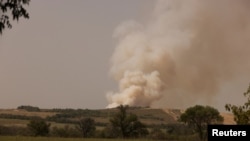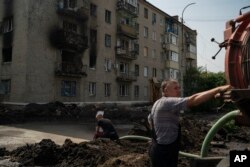Ukraine and Russia each accused the other of attacks near Ukraine’s Zaporizhzhia nuclear power plant Sunday, amid ongoing international concern that the facility itself could be hit and cause a radiation leak.
Russia launched new rocket and artillery attacks near the facility early Sunday, with Ukrainian officials reporting significant damage.
Ukraine's Valentyn Reznichenko, governor of the Dnipropetrovsk region, said that heavy firing during the night left parts of Nikopol, about 10 kilometers from the nuclear site, without electricity. Rocket strikes damaged about a dozen homes in another nearby city, Marhanets.
The city of Zaporizhzhia, about 40 kilometers upriver from the nuclear facility, was also attacked, with city council member Anatoliy Kurtev saying two people were injured.
Russian Defense Ministry spokesman Igor Konashenkov claimed Sunday that shells fired by Ukrainian forces fell near buildings storing reactor fuel and radioactive waste.
The U.S. State Department accused Russia of blocking a consensus document on a nuclear non-proliferation treaty because the agreement noted the risk posed by fighting near the Zaporizhzhia plant.
"For the Russian Federation to not accept such language in the face of overwhelming international consensus underscores the need for the United States and others to continue urging Russia to end its military activity near ZNPP and return control of the plant to Ukraine," the statement said.
Despite the attacks, International Atomic Energy Agency Director-General Rafael Mariano Grossi said Ukraine had told it that “all safety systems remained operational and there had been no increase in radiation levels.”
Grossi said that Ukraine reported all radioactivity measurements were within normal range and there was no indication of hydrogen leakage. Officials are particularly concerned about the cooling systems for the plant's nuclear reactors. A cooling system failure could cause a nuclear meltdown.
Iodine tablets have been handed out to residents who live near the Zaporizhzhia plant in case of radiation exposure.
Grossi said the continued shelling near the plant remains a risk, with both Russia and Ukraine accusing each other of shelling near the facility. The plant has been controlled by Russia since early in its six-month invasion but is operated by Ukrainian engineers.
Grossi said he is continuing discussions with Ukraine and Russia to allow IAEA experts into the facility in the coming days to assess any damage from the weeks of shelling near the plant and whether all its systems are functional.
Ukraine’s energy minister adviser, Lana Zerkal, said the IAEA, a United Nations agency, is expected to visit the site this week.
Moscow said it supports the work of the IAEA but has refused to withdraw its soldiers from the complex to create a demilitarized zone.
An engineer working under Russian occupation since March 4 at the Zaporizhzhia power plant has told VOA that Russian forces have placed artillery and missile installations within and around the property.
The engineer, whose identity is being withheld for fear of retaliation by the occupying authorities, supports Ukrainian government claims that Russia itself is responsible for the explosions.
In his nightly address to the nation, Ukrainian President Volodymyr Zelenskyy vowed to retake the separatist areas captured by Russia since its invasion began six months ago.
"Now Donbas is almost destroyed by Russian strikes, devastated," he said. "The proud and glorious Ukrainian Donetsk was humiliated by the Russian occupation and robbed. Russia brought the most terrible thing there — an absolute disregard for the value of any life, absolute disrespect for anyone. … And they believe that they are there forever. But it's a temporary thing for them. And Ukraine will return. For sure."
Some information for this story came from The Associated Press, Agence France-Presse and Reuters.








